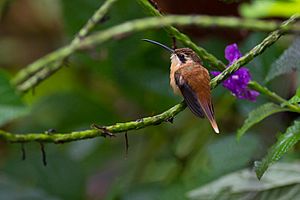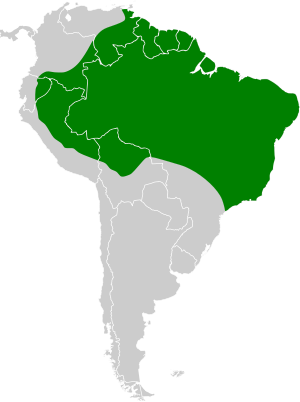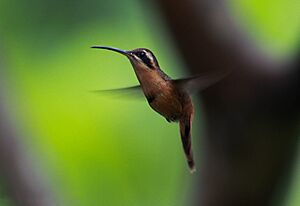Reddish hermit facts for kids
Quick facts for kids Reddish hermit |
|
|---|---|
 |
|
| Conservation status | |
| Scientific classification |
|
| Kingdom: | Animalia |
| Phylum: | Chordata |
| Class: | Aves |
| Order: | Apodiformes |
| Family: | Trochilidae |
| Genus: | Phaethornis |
| Species: |
P. ruber
|
| Binomial name | |
| Phaethornis ruber (Linnaeus, 1758)
|
|
 |
|
| Script error: The function "autoWithCaption" does not exist. | |
| Synonyms | |
|
Trochilus ruber Linnaeus, 1758 |
|
Script error: No such module "Check for conflicting parameters".
The reddish hermit (Phaethornis ruber) is a tiny, colorful bird that belongs to the hummingbird family, Trochilidae. You can find this special bird in several South American countries. These include Bolivia, Brazil, Colombia, Ecuador, Peru, Venezuela, and the Guianas.
Contents
Understanding the Reddish Hermit's Name
How the Reddish Hermit Got Its Scientific Name
The reddish hermit has a long history of being studied by naturalists. In 1743, an English naturalist named George Edwards first drew and described this bird. He called it "The little brown huming-bird." His drawing was based on a bird from Suriname.
Later, in 1758, the famous Swedish naturalist Carl Linnaeus gave the bird its first scientific name. He put it in the genus Trochilus and named it Trochilus ruber. The word ruber is Latin for "red," which describes the bird's color. Today, the reddish hermit is in the genus Phaethornis.
Different Types of Reddish Hermits: Subspecies
Scientists recognize four main types, or subspecies, of the reddish hermit. These are:
- P. r. episcopus
- P. r. ruber
- P. r. nigricinctus
- P. r. longipennis
Sometimes, scientists wonder if P. r. episcopus and P. r. nigricinctus might be separate species. More research is needed to confirm this idea.
What Does a Reddish Hermit Look Like?
The reddish hermit is a small bird, usually about 8 to 9 cm (3.1 to 3.5 in) long. It weighs only 1.8 to 3 g (0.06 to 0.11 oz), which is less than a penny!
Colors and Markings
Most reddish hermits are dark green and reddish-brown on their upper parts. Their undersides are a warm cinnamon-red color.
- Males often have a black band across their chest. Their tail feathers have thin white or reddish tips.
- Females usually have lighter colors on their undersides compared to males.
Differences Among Subspecies
Each subspecies has slight differences in size and color:
- P. r. episcopus has orange-red undersides instead of cinnamon-red.
- P. r. nigricinctus is the smallest subspecies and has the richest red color on its belly.
- P. r. longipennis is the largest subspecies. It has a whitish chin and reddish tips on its central tail feathers.
Where Do Reddish Hermits Live?
The different subspecies of reddish hermits live in various parts of South America:
- P. r. episcopus lives in central and eastern Venezuela, Guyana, and northwestern Brazil.
- P. r. ruber is found from Suriname and French Guiana, through Brazil, and west into southeastern Peru and northern Bolivia.
- P. r. nigricinctus lives in eastern and southern Colombia, southwestern Venezuela, eastern Ecuador, northeastern Peru, and northwestern Brazil.
- P. r. longipennis is found in southeastern Peru.
These birds usually stay in one area and do not migrate.
How Reddish Hermits Live Their Lives
What Do Reddish Hermits Eat?
Reddish hermits are like other hermit hummingbirds. They are "trap-line" feeders. This means they visit a regular circuit of many different flowering plants to drink nectar. They also eat small arthropods, like tiny insects or spiders. Sometimes, they are seen piercing the base of flowers to get nectar.
Life Cycle and Reproduction
The breeding season for reddish hermits changes depending on where they live. In northern areas, they usually breed from May to October. In southern areas, it's from October to February.
The female builds a cone-shaped nest. She uses plant fibers, moss, and spider webs. The nest is often attached to the underside of a drooping leaf. She lays two eggs, and only the female bird takes care of incubating them.
Reddish Hermit Sounds
The song of the reddish hermit is high-pitched and repeated often. It sounds like "tsee....tsee...tsee...tsee.tse.tsitsi." They often sing for a long time at special gathering spots called leks. They also make "long whining calls" when they are hovering and a "stip!" sound when flying.
Conservation Status of the Reddish Hermit
The IUCN (International Union for Conservation of Nature) has listed the reddish hermit as a species of "Least Concern." This means they are not currently in danger of extinction. Even though their exact population size is unknown, they are found over a very large area. They are considered common in many places and live in several protected areas.
See also
 In Spanish: Ermitaño rojizo para niños
In Spanish: Ermitaño rojizo para niños
 | Charles R. Drew |
 | Benjamin Banneker |
 | Jane C. Wright |
 | Roger Arliner Young |



